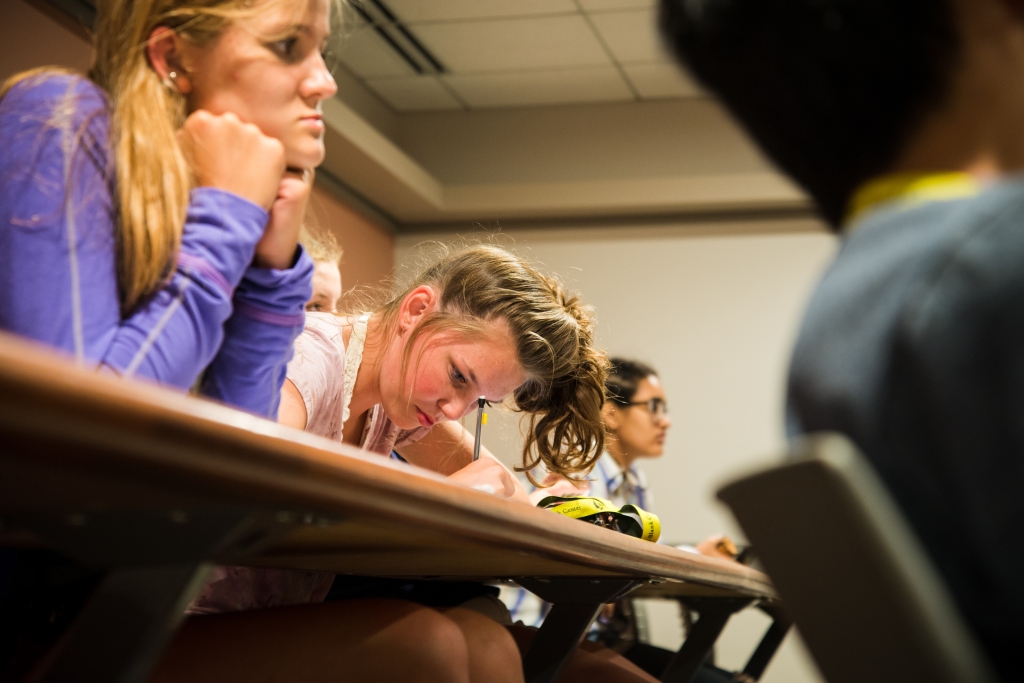A recent question on the Belin-Blank Center’s email listserv for gifted education teachers sparked a conversation about various success stories and best practices from experienced IOAPA mentors. With their consent, I have gathered that advice into a blog post so more teachers can benefit from their experiences.
Importance of Frequent Face-to-Face Connection
Several mentors indicated the necessity of face-to-face interaction with students to monitor performance and promote progress. Deann Scearce (Mount Vernon Middle School) indicated that her 7th and 8th grade students are scheduled into her classroom every other day for their IOAPA class. IOAPA requires courses to be scheduled as part of students’ regular school day, and recommends that the mentor be available during scheduled work time. Kelley Grothus (Madrid Middle School) schedules her students for 1.5 hours each day (including lunch). She says, “Sometimes we sit together to go through the material or just so they can talk through their quiz prep and have someone listen to them. Through lunch, I make them the teacher and have them explain what they are learning to me.” Marcia Powell (Oelwein Middle School) uses her mentoring time to “have a conversation if [students] are lagging and to encourage them or reward them with smiles, high-fives, or something else.”
In addition, Kelley noted the benefit of developing an online learning community. IOAPA permits schools to register up to 6 students per course, and Kelley uses that to her advantage by offering specific courses each semester (i.e., creative writing one semester, and psychology the next). She reported that “this allows that kids to work together & discuss rather than learn in isolation.” Similarly, Marcia recommends that students “enroll in groups of two or three so they can bounce ideas off of one another.” These opportunities for collaboration with peers, as well as the mentoring component included in the IOAPA model, establish a platform for success in online learning.

Benefits of the Online Curriculum
Our mentors appreciate the benefits of these self-contained online classes. Michelle Kavars (Lewis Central Middle School) touted the fact that “there is no real need to ‘teach’ lessons as there are videos, exercises, self-checks, and quizzes along the way.” Each course is a little different, and includes different instructional modalities specifically designed to address the course content; however, this mix of videos, readings, assignments, and quizzes is common, and content expertise is not necessary for IOAPA mentors as all the necessary content for our middle school courses is taught by the online instructor. Kelley attested that “the content is well-organized, sequenced, & managed for you, allowing me to expose the students to a variety of content that matches their strengths and interests.”
Significance of Purposeful Planning
IOAPA allows schools to make courses available to students based on their unique needs and interests, when doing so in person would be resource-prohibitive. However, as many of our mentors reported, purposeful planning is key to success in online learning. Kelley strives to give her students “an authentic & personal connection to the online content.” Our other mentors indicated similar efforts to overcome skepticism often associated with online learning through intentionally establishing ways to connect with students.
This planning is also essential when determining what IOAPA courses to make available to students. Taking advantage of courses offered in person, even if at another grade level, is valuable; according to Kelley, “when there is an in-person expert to teach [students], we utilize that.” IOAPA prohibits schools from using our online courses to help with scheduling conflicts; schools are only permitted to offer those courses that are not already available to students through the school. In the case of middle school courses, if transportation or other issues prevent students from accessing an appropriately challenging course within their district, IOAPA courses may be used to address those needs. For example, if an 8th grade student requires geometry, but the course is only available at the high school level, they would be permitted to enroll in the IOAPA Geometry course. We would still recommend prioritizing in-person classes if it is feasible to do so.

When offering IOAPA middle school courses, one of the most frequent conversations you’ll have with parents and administrators will concern credit. It will be essential to discuss with middle school and high school administrators how credit will be assigned for IOAPA middle school classes, which are high school level courses offered out-of-level to younger-than-typical students. You can see our previous blog post on this issue. Deann’s school follows a unique credit policy: Students review their final grade and decide if they want to receive high school credit – with the grade they earned going on their high school transcript and affecting their high school GPA.
Finally, planning cannot end with the current school year. Marcia indicated the importance of considering each student’s course progression through high school, and considering alternative courses that could supplement learning in a content area (i.e., offering online computer science or statistics to a math-talented student, in addition to challenging math curriculum), especially if sufficiently advanced courses in the content area are likely to be unavailable later in the student’s academic career.
Conclusion
Overall, our mentors express satisfaction with the IOAPA program, and we know that this program would not be successful without the tireless work they put in each day to support students. If you’re interested in making these classes available to your students, visit belinblank.org/ioapa. Contact ioapa@belinblank.org with questions, and stay tuned to the blog for more advice from students and mentors this summer.























































